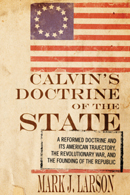
Mark J. Larson
Reviewed by: Arthur J. Fox
Calvin's Doctrine of the State, by Mark J. Larson. Published by Wipf & Stock, 2009. Paperback, 148 pages, list price $18.00. Reviewed by OP pastor Arthur J. Fox.
We do not often think of John Calvin as addressing modern political issues, but this book shows how he applied the Bible to the issues of war and politics that we wrestle with in the twenty-first century.
Let's get my two minor negative comments out of the way first. At times the author seems to drift away from Calvin to tell us what other theologians of his day taught. This would be more helpful if the connections between the positions of Calvin and such figures as Henry Bullinger and Peter Martyr Vermigli were consistently made, but they are not. And as for style, I find it hard to understand why, when quoting old writers, antiquated spelling is retained.
Those minor points aside, this is a great book! It is a masterful, simple, and cogent presentation of Calvin's teaching on government and war, in which Larson exposes and corrects some misconceptions of Calvin's teaching.
Did Calvin establish a theocracy in Geneva? Larson demonstrates that he did not. Geneva's civil government was separate from the church. "Calvin in his political doctrine did not espouse a theocratic government." In fact, Larson proves that Calvin thought a republic was the best form of government. Making the connection with the United States, Larson declares, "The trajectory from Calvin, specifically his advocacy of republicanism and his distaste for democracy, down to the American Constitutional Convention of 1787 is unmistakable" (p. 94). On the other hand, he also favored a holy commonwealth, in which the state supports and protects the church and punishes violations of God's laws.
Did Calvin teach that a lesser magistrate was permitted to lead a rebellion against a higher magistrate? Again, Larson says no. Rather, Calvin taught that "a representative body that was appointed in an elective manner … had the duty to withstand … the fierce licentiousness of kings" (who oppressed their people).
Did Calvin believe that the church has authority to initiate armed conflict? No. This prerogative belongs to the civil magistrate. And such a war has to be just. There must be a legitimate authority initiating it, a just cause (e.g., defense), and a right intention. Calvin also taught (based upon Deuteronomy 20) that war must be fought justly. This means, for example, that "enemies who laid down their arms in battle and who appealed for mercy should be spared" (p. 48).
This book is worthy of our consultation as we wrestle to establish and maintain a Christian view of war, peace, and democratic freedoms.
January 18, 2026
January 11, 2026
Texts that Transform: Church and Ministry
January 04, 2026
December 28, 2025
December 21, 2025
December 14, 2025
December 07, 2025
© 2026 The Orthodox Presbyterian Church